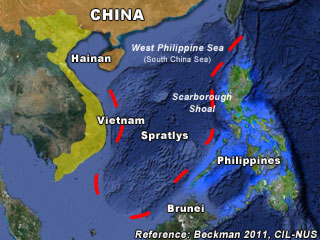(Editor’s Note: Printed with the permission of the author. Due to space constraint, this would be printed in two series; the second part would appear in our next issue. This article originally appeared in the July 31, 2020 issue of the Manila Times.)
PRESIDENT Duterte’s comments on our disputes with China over the South China Sea in his recent State of the Nation Address (SONA) have resuscitated Yellow zombie ideas.
That phrase was coined by Nobel laureate Paul Krugman, who titled the latest collection of his columns, ‘Arguing with Zombies: Economics, Politics, and the Fight for a Better Future.’
“Zombie ideas,” he explained, are “ideas that should have been killed by contrary evidence, but instead keep shambling along, eating people’s brains.”
Such a huge zombie idea is the Yellow claim that the arbitration suit against China that the Aquino 3rd government filed in 2013, the award for which was handed down in 2016, was a victory in that it upheld our territorial and maritime claims in the South China Sea.
It is a testament to the power of the United States and its media, and its local minions, that this zombie idea has been kept alive.
Ironically, the communists, who claim to be enemies of US imperialism, have been one of the noisiest propagandists for what has been America’s very clever strategy to demonize China that is challenging its hegemony in Asia.
Because of the failure of President Duterte’s officials to unravel for him this Yellow zombie idea, the Yellows have pounced on his statements on the issue in his SONA as defeatist: “China is claiming it. We are claiming it. China has the arms; we do not have it. So, it is as simple as that.”
The missing sentences here should have been right after the first two: “The past administration even sued China to assert our claims, but totally failed. The next step could only be military action.”
Among the zombie ideas in the overarching fallacy that the arbitration asserted our claims in the South China Sea are as follows:
Del Rosario:
President Benigno Aquino 3rd’s Foreign Affairs secretary Albert del Rosario’s zombie idea:
“Most countries want the arbitral verdict enforced.”
The reality: seven countries oppose the award, which include Russia and Taiwan; 33 nations — including those of European Union — “acknowledge the ruling but do not call for compliance;” and, 147 countries have simply ignored it.
Only seven countries out of 194 surveyed are demanding that China comply with the award. Except for Vietnam, all of these seven, especially Australia and Japan, have always followed slavishly the US line in foreign relations — so that they were at the forefront of America’s colossally illegal invasion of Iraq in 2003 on grounds that it had “weapons of mass destruction.”
Vietnam has had many of its troops killed and vessels sunk in its skirmishes with China over territory in the South China Sea and has had oil exploration ventures with the US in the Spratlys blocked by China. It would be strange if it did not support something that demonizes China.
The US is so hypocritical to ask for the enforcement of an arbitration award that is based on the United Nations Convention on the Law of the Sea (Unclos): it does not recognize it, as it has not ratified the treaty that took effect in 1994 when 60 nations signed it.
These figures are according to the Asian Maritime Transparency Institute, a think-tank/propaganda platform that the Washington-based Center for Strategic and International Studies set up to disseminate the US views on the South China disputes.
Experts
Oxford academic Stefan Talmon, one of the most respected experts in international law, even strongly put it: “The award in the South China Sea arbitration did not receive the rousing endorsement some had hoped for. For example, the 28-member European Union only ‘acknowledged’ the award. No State expressly endorsed the substance of the award.”*
A Philippine Star columnist’s zombie idea: “The Hague arbitration outlawed China’s grab of Scarborough Shoal,” and upheld our sovereignty over it.
The reality: the award (please, please read it) in several places emphasized that it cannot rule on the issue of Scarborough Shoal’s sovereignty:
– “The tribunal records that this decision is entirely without prejudice to the question of sovereignty over Scarborough Shoal.” (page 318)
– “The tribunal has not addressed — and will not address — the question of which State has sovereignty over Sandy Cay, Thitu, or Scarborough Shoal and would thus have an entitlement to the surrounding territorial sea.” (p. 296)— end of first part.
